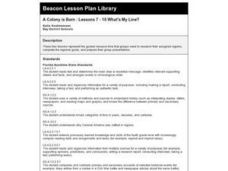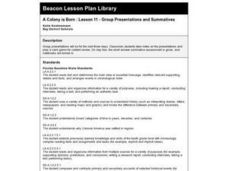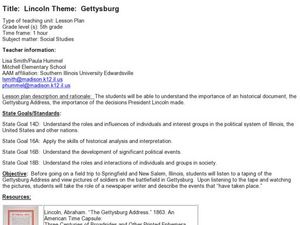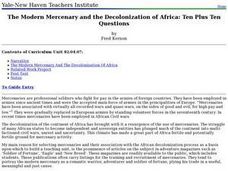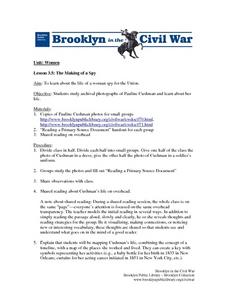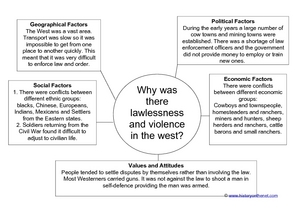Curated OER
Creating A Memorial Day Poster Poem
In this activity, students create a Memorial Day word web and use it to create a poem about Memorial Day. They can write the poem and illustrate it as a poster.
Curated OER
Cinco de Mayo
Students identify three celebration activities participated in Cinco de Mayo and explain their significance.
Curated OER
Field Trips Can Inspire Students to Write Creatively
Fieldtrips can lead to a variety of writing experiences for students.
Curated OER
Honoring Memories: Memorial Day Lesson Plans
Memorial Day lesson plans can help students understand the history of this holiday which honors those who died serving their country.
Curated OER
Black History Web Design
Each student or student team creates a web page. Students research and make decisions for content of the page. Each web page should contain at least six images and six links, as well as any necessary commentary. Students indicate on the...
Curated OER
Memories to Last: Observing Monuments
Students use scientific observation and inference to examine the Hazen Brigade Monument. In this observation lesson plan, students review the reasons for building monuments in society. Students then recall monuments they have seen...
Curated OER
Oliver Cromwell
In this online interactive history activity, students respond to 7 short answer questions about Oliver Cromwell. Students may check some of their answers on the interactive activity.
Curated OER
Am I Really Free?
Fourth graders write about slavery and freedom. In this freed slaves lesson, 4th graders read historical information about free blacks during slavery and explore books, objects and slave narratives to learn more. Students...
Curated OER
Crazy Horses' Vision Teacher's Guide
Third graders read and discuss the story of Crazy Horse. In this Crazy Horses' Vision teacher's guide, 3rd graders examine the life of Native American, Crazy Horse. Students answer questions, perform literature circle roles, and...
Curated OER
A Colony is Born : Lesson 4 - What Went Wrong?
Fifth graders compare and contrast two early colonies and make a T chart. They list examples of worked well and what did not, and significant historical events. They use higher order thinking skills by deducing how different scenarios...
Curated OER
A Colony is Born : Lesson 6 -To Leave or Not to Leave
Fifth graders connect reasons for coming to the New World with identity. The create identities and place them in one of three settled regions. They refer to prior study notes in their Colonial Notebooks to establish their identities.
Curated OER
A Colony is Born : Lessons 7 - 10 What's My Line?
Fifth graders research their assigned regions, complete regional guide and prepare presentations about the New World colonists. They refer to "Everyday LIfe: Colonial Times" as well as searching marked internet sites.
Curated OER
A Colony is Born : Lesson 11 - Group Presentations and Summatives
Fifth graders give presentations on colonial research. The others take notes on the presentations. They play a card game which helps them review content. They take a summative assessment and present their research notebooks.
Curated OER
Progression of Political Movements
Students examine the various political parties throughout history. In groups, they are given documents identifying the platforms of the parties in the 1868 election. To end the lesson, they share their information with the class and...
Curated OER
Michigan History of Philanthropy
Students investigate how philanthropy began in Michigan. In this philanthropy lesson, students read Michigan History of Philanthropy and read a timeline of several events. Students create a picture with a sentence about a time when they...
Curated OER
Lincoln Theme--Gettysburg
Fifth graders explore the significance of the Gettysburg Address. In this United States history lesson plan, 5th graders listen to a Gettysburg Address recording and look at photos of the battlefield. Students discuss their observations...
Curated OER
Household Names
Students explore the accomplishments of famous New Yorkers in the 19th century. In small groups, students read biographies and match them with a corresponding primary source document. The group that is most accurate in matching the...
Curated OER
The Modern Mercenary and the Decolonization of Africa: Ten Plus Ten Questions
Learners examine the role of the mercenary in the decolonization of Africa by answering the following questions: (1) Who and what is the modern mercenary; pro and con?, (2) What are some of the factors or elements which acclimatized the...
Curated OER
Historical Fiction: A Wealth of Interpretations
Students read a book from the Dear America series and contrast different points of view. They respond to the book either by participating in a literature circle or completing a journal entry. They compare and contrast two books or a...
Curated OER
The Making of a Spy
Students study the life of a woman spy for the Union. They study archival photographs of Pauline Cushman and examine her life. They create a key with
symbols representing her activities (e.g., a baby bottle for her birth in 1833 in New...
Curated OER
Doing Our Share Lesson 1: Michigan History of Philanthropy
Students research the history of philanthropy in Michigan by looking at images and pictures while discussing the definition of philanthropy. They design a picture of the first time they saw a philanthropic act and write three sentences...
Curated OER
A Colony is Born : Lesson 2 - Sez Who?
Second graders increase their baseline knowledge of primary and secondary sources and the likenesses and differences of them with regard to a selected historical event.
Curated OER
You Forgot Your Skirt, Amelia Bloomer!
Students study women's clothing in the 19th century as well as one prominent
feminist of the time. They examine women's dress of the period from the picture book read aloud You Forgot Your Skirt, Amelia Bloomer! They provide adjectives...
Curated OER
American West: Lawlessness and Violence
In this American West worksheet, students read about the reasons for lawlessness and violence in the American West. Students learn about geographical factors, political factors, economic factors, social factors, values, and attitudes.













